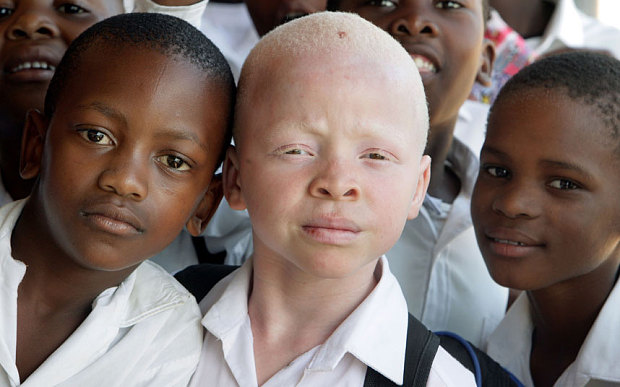
NAIROBI (Thomson Reuters Foundation) – At least 15 people with albinism, mostly children, have been killed, wounded, abducted or nearly abducted in East Africa in a surge in violence against albinos in the past six months, the United Nations (U.N.) said on Tuesday.
The UN said there has been a marked increase in the number of attacks on albinos in Tanzania, Malawi and Burundi, where their body parts are prized in black magic with three incidents in the past week as gangs roam southern Malawi hunting for them.
“These attacks are often stunningly vicious, with children in particular being targeted,” the U.N.’s High Commissioner for Human Rights, Zeid Ra’ad Al Hussein, said in a statement.
“Many people with albinism are living in abject fear.”
Children with albinism, who lack pigment in their skin, hair and eyes, have stopped attending school because of the risk of assault, murder or kidnapping, he said.
The U.N. called on regional governments to ensure the criminals behind the attacks are prosecuted.
“They are maybe not doing enough to stop it,” the U.N.’s human rights spokesman Rupert Colville told a news briefing in Geneva on Tuesday.
“This is an incredibly vulnerable population in these countries. And when you hear these kind of details of gangs of men roaming around, literally hunting down people with albinism simply to make money by cutting off their limbs and killing them, you must question whether enough is being done.”
In Malawi, at least six incidents have been reported in 2015, compared to four incidents over the previous two years.
Victims range in age from one to 68 years, with their limbs often being hacked off. Relatives have been implicated in the kidnapping and murder of children who have been snatched from their beds.
An uncle is among three men facing charges in Malawi for the kidnapping of an 11-year-old Malawian girl in January. He reportedly later said that he had been promised $6,500 for her body, the U.N. said.
Witch doctors will pay as much as $75,000 for a full set of albino body parts, according to a Red Cross report, using them to make spells believed to bring good luck, love and wealth.
Most cases occur in Tanzania, where there have been eight attacks, including two murders and one gang-rape, since August, the U.N. said, with fears of further attacks ahead of elections later this year when politicians will be seeking good fortune.
The father of a six-year-old Tanzanian boy, whose hand was cut off with a machete at his home on last weekend in Sumbawanga district, is among seven suspects facing charges.
The Tanzanian government imposed a ban on witchcraft in January and President Jakaya Kikwete has vowed to stamp out the practice he says brings shame to his nation. Police last week arrested 32 witch doctors in a bid to stop the attacks.
source:reuters





